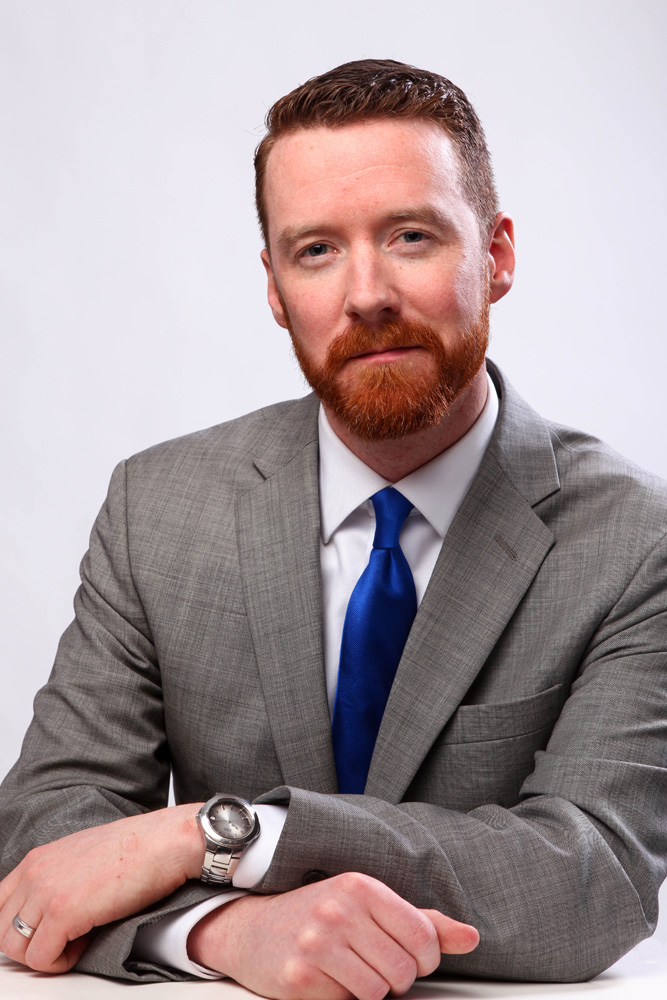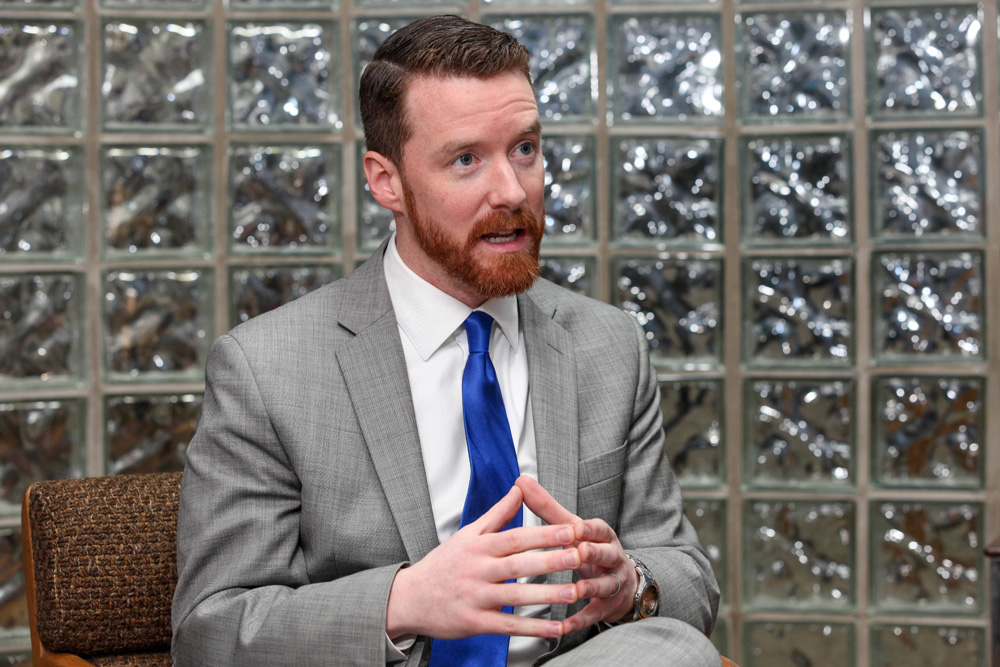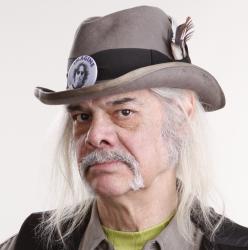Born and raised in Syracuse, Andrew Maxwell is the seventh generation of an Irish family that calls Central New York home. A graduate of Corcoran High School, he grew up with an orientation to public service. “I decided that the best way for me to try to make a difference in the world was to try to make a difference in my hometown,” he maintains.

He followed that orientation through a bachelor of arts degree from St. John Fisher College and a master of public administration degree at Syracuse University’s Maxwell School. He jumped from academe to actual practice at City Hall as senior neighborhood planner and director of the Planning Agency, the Bureau of Planning and Sustainability, and now Policy and Innovation. He served as an Obama delegate at the 2012 Democratic National Convention.

What is your job description for the mayor of Syracuse?
One of the most important things a mayor can do is set a tone for the city. It’s important that our focus in this campaign is building a city for the future.
At times, in this community, we suffer from a degree of cynicism and self-doubt, and sometimes suffer from the tyranny of low expectations. I think we need to be bold. We need to be thinking about new ways for us to solve our problems as a community, ways for us to come together, focus on what the future of Syracuse is like.
A lot of our public discourse falls into old baggage and old disagreement, and I think there are ways to learn from our past. But it is important that if we’re going to be effective in solving the challenges we’re facing in the community, we have to be focused on the future. We have to be focused on new solutions, things that we can learn from other communities, coming together and hearing ideas from across the community.
We talk about our biggest challenges: poverty, concentrated poverty, understanding that research indicates we have some of the highest, if not the highest rate of concentrated poverty among black and Hispanic communities. That is unacceptable. While that information may not be news to people who have been here, lived here and done work here, it is important that we acknowledge those realities and listen to the people who face those challenges personally, if we’re going to solve them.
Should we metropolitanize the city and county governments?
It’s important that we explore new ideas. This campaign season should be a campaign about ideas, but the details matter. Focusing on ways to consolidate or share services, ways for us to work together across the community, that’s important.
I’ve been a part of that work. I was director of our consolidated city-county planning agency, so I’ve led efforts to bring people together and work on those issues and ways that are more efficient, more effective for our community.
Looking at our larger government structurally, it’s important to discuss ideas, but it’s equally important to have equal representation for everyone. We have to be serious about taking on the challenges we face financially and otherwise, but I would be adamantly opposed to any proposed reorganization that would jeopardize the representation of the people in the city.
It doesn’t mean I’m not willing to discuss new ideas. I’m a believer that we need new ideas if we’re going to be serious about having a brighter future as a community. But we have to be very thoughtful. I think that’s what people in the community expect from their elected representation.
Should we consolidate the city schools with those in the county?
That’s another area where we shouldn’t take anything off the table. I know that a lot of our consolidation discussions in recent years have been about other public services and not about schools. It would be irresponsible to leave schools off the table.
I think a lot of the divide that we see between the city and suburbs relates to our school environment and the economic and racial segregation that exists between our city and suburban school districts. Meanwhile, we know that people in the city — young families, people who have children that approach school age — think very seriously about leaving the city because they don’t have confidence in city schools. We have to be incredibly mindful of that challenge. It’s a very personal decision that people make, even people who are deeply passionate about the city and city living.
We have to improve our schools, and give people that confidence that they are sending their children to schools that are safe, that are modern, where they’re getting good instruction. Whether it’s our Joint Schools Reconstruction Project, or how we develop things like careers in technical education, we have to be ever-focused on improving the experience of students and families so that our school district is a clear asset to what it means to live in the city of Syracuse.
What do we do with Route 81?
I am completely in favor of tearing down the highway and building the community grid. Thinking again, setting the tone, what sort of city are we going to be in the future, we cannot repeat the mistakes of the past.
In this case, we do have the benefit of history, to know what it means to build a highway through the heart of a community, with the negative social, economic and environmental impact that has resulted for decades. This project is an opportunity not just for transportation, but for us to embrace a new vision for the center of our city, a vision that is about connecting communities, not dividing them, a vision that is about reinvestment and creating opportunities for new growth and development in keeping with our vision for a more beautiful, more walkable, more bikeable city. That’s what we need to be focused on.
I understand the many concerns that people have about this project. Change is difficult. But we need to embrace this as an opportunity to really craft the kind of future we want in the city. Building a community grid is our way to do that, and I think it’s in keeping with our community values.

What needs to be developed in the center city, who should be doing it and who should be paying for it?
The growth in the center of our city, growth that we’ve seen building over the course of recent years and the last couple of decades, is something we should be encouraged by. For me, growing up in Syracuse, there was not a belief that our downtown was going to be a strong and vibrant neighborhood. We are seeing that changed.
But that growth needs to be inclusive. It needs to be accessible for entrepreneurs and small-business people. It needs to be inclusive for people of all incomes and backgrounds. So the success that we’re seeing today downtown, we need to see that success translate to the rest of the city.
I think we’re right to focus on building our community from the inside out, with the new growth and vibrancy that we’ve seen in our downtown. It’s something we should be proud of, but we should also be focused on what that looks like in the future, making sure we have equitable economic development that is fair for the taxpayer, and fair and open for those to do business.
Syracuse has the poorest communities of color in the country. As mayor, what could you do?
Dealing with poverty, I would never pretend to have all the answers. I don’t think there’s any community that we could point to that we could say has solved poverty.
Poverty is a composite of many other factors. There are things we can do together to deal with strengthening our schools, providing reliable services, focusing on public safety and crime.
Violent crime is down in our city, but looking at the number of homicides we had last year, and the gun violence that has plagued our community, is unacceptable. If we do not confront that in a meaningful way, and do the work of improving our neighborhoods, improving our housing stock and creating opportunity for people in our city, then we are not going to meaningfully change the overall patterns that we’ve seen in terms of poverty in this community.
I believe that working together across the community, different levels of government, different organizations that provide meaningful public services, it has to happen in a collaborative way. Collaboration is the key to who I am, as a person and as a public servant.
City government is not going to solve these things alone. But we can provide leadership. And working with others, I do believe a city, especially one of our size, we can and must do something about the poverty in the city.



